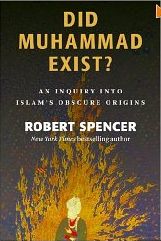In 2008 Professor Muhammad Sven Kalisch, a convert to Islam since the age of 15 and practicing Muslim who taught Islamic Theology at Munster University in Germany announced that he no longer believes that Muhammad existed. According to his own testimony in German, Kalisch made the following statement:
"My position with regard to the historical existence of Muhammad is that I believe neither his existence nor his non-existence can be proven. I, however, lean towards the non-existence but I don't think it can be proven either. It is my impression that, unless there are some sensational archeological discoveries – i.e. an Islamic "Qumran" or "Nag Hammadi" — the question of Muhammad’s existence will probably never be finally clarified."
 |
Kalisch began his essay as follows:
"Up to some time ago I was convinced that Muhammad was a historical figure. Although I always based my thinking on the assumption that the Islamic historical narrative regarding Muhammad was very unreliable, I had no doubts that at least the basic lines of his biography were historically correct.
I have now moved away from this position and will soon publish a book in which I will, among other things, comment on this question and explain my arguments in more detail. This essay is only a short summary of my most important arguments."
The book was never written probably due to outrage in the Muslim community, declarations of apostasy from radical Clerics and a genuine fear for his life. While Kalisch never published his thesis, now in 2012, famed critic and bestselling author Robert Spencer has published his own investigative work on the question at hand. Spencer is a Christian who is more interested in exposing Islam then preaching Christianity, has rightfully entitled his publication “Did Muhammad Exist, An Inquiry into Islam’s Obscure Origins”.
Muslims will immediately jump on the bandwagon of Spencer simply being an opportunist and hatemonger hoping to make some money through a proactive title. Quite to the contrary this book promotes legitimate investigation to the question it posits.
Spencer argues that for the first sixty years, between the 630’s to 690 AD, there is no mention of the Qur’an or Muhammad by either the Arab conquerors or those who were conquered. He argues that such an omission and “extraordinary silence” is absolutely strange from a historian’s perspective. Spencer does say that he believes that a man by the name of Muhammad may have existed in the same way that a Robin Hood may have existed, but all of the stories and legends about him were likely made up by competing factions who are documented by Muslim scholars themselves as fabricating stories for political reasons and/or to support their beliefs and practices.
The book goes into further fascinating details about the possibility of the name ‘Muhammad’ which is mentioned in the Qur’an no more than four times without any details about a historical figure, could have simply been an attribute given to Jesus by certain Unitarian Christians. A coin which was minted during the early parts of the Muslim era shows one side of the coin with a man holding a cross and on the other side the name of Muhammad.
Regardless of whether Muhammad existed or not, Spencer makes a valid point that such an investigation and inquiry is necessary and that while scholars such as Bart Ehrman are able to produce material to question the existence of Jesus (others such as Richard Carrier and Acharya S / DM Murdock have also questioned the existence of Jesus) or for that matter investigation into the existence of any other historical figure, why should Muhammad be exempt? Perhaps the right of inquiry and investigation of this sort is more valuable than the conclusion itself.



Comments powered by CComment